Lawn Aerator Rental Market
Lawn Aerator Rental Market Size and Share Forecast Outlook 2025 to 2035
Lawn aerator rental market is projected to grow from USD 460.0 million in 2025 to USD 660.0 million by 2035, at a CAGR of 3.7%. Walk-behind will dominate with a 55.0% market share, while residential will lead the application segment with a 70.0% share.
Lawn Aerator Rental Market Forecast and Outlook 2025 to 2035
The lawn aerator rental market stands at the threshold of a decade-long expansion trajectory that promises to reshape equipment distribution and lawn care applications across residential, commercial, and professional sectors. The market's journey from USD 460.0 million in 2025 to USD 660.0 million by 2035 represents measured growth, the market will rise at a CAGR of 3.7% which demonstrating the steady adoption of aerator technology and lawn maintenance optimization across residential properties, commercial landscaping, and professional groundskeeping applications worldwide.
Quick Stats for Lawn Aerator Rental Market
- Lawn Aerator Rental Market Value (2025): USD 460.0 million
- Lawn Aerator Rental Market Forecast Value (2035): USD 660.0 million
- Lawn Aerator Rental Market Forecast CAGR: 3.7%
- Leading Type in Lawn Aerator Rental Market: Walk-behind Segment
- Key Growth Regions in Lawn Aerator Rental Market: South Asia Pacific, East Asia, and North America
- Top Players in Lawn Aerator Rental Market: Billy Goat, Ryan Turf, Classen, Toro, BlueBird
- Where revenue comes from - Now Vs Next (Industry-level view)
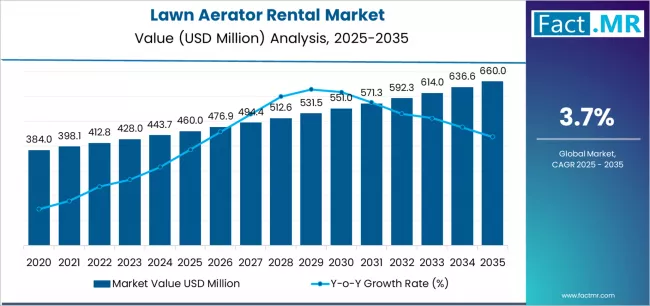
The first half of the decade (2025-2030) will witness the market climbing from USD 460.0 million to approximately USD 551.2 million, adding USD 91.2 million in value, which constitutes 46% of the total forecast growth period. This phase will be characterized by the continued adoption of residential and commercial applications, driven by increasing lawn care demands and the growing need for reliable equipment solutions in soil aeration and turf maintenance applications globally. Enhanced rental capabilities and automated inventory management systems will become standard expectations rather than premium options.
The latter half (2030-2035) will witness continued growth from USD 551.2 million to USD 660.0 million, representing an addition of USD 108.8 million or 54% of the decade's expansion. This period will be defined by mass market penetration of commercial aerator applications, integration with comprehensive equipment management platforms, and seamless compatibility with existing rental infrastructure. The market trajectory signals fundamental shifts in how lawn care consumers approach equipment rental and maintenance operations, with participants positioned to benefit from growing demand across multiple equipment segments and rental channels.
Beyond conventional drivers, the market is expected to experience growth fueled by sustainability trends and eco-conscious landscaping practices. Environmentally minded property owners and commercial landscapers are increasingly opting for precision aeration techniques that reduce water runoff, improve soil oxygenation, and support healthier turf with fewer chemical inputs. Rental providers that offer energy-efficient or battery-powered aerators stand to capture a premium segment of this environmentally aware clientele.
Partnerships with landscape design firms and subscription-based rental models for recurring seasonal maintenance are expected to emerge, creating stable revenue streams and fostering long-term client relationships. Integration of IoT-enabled sensors in rental equipment, offering real-time soil condition monitoring and predictive maintenance, is also likely to enhance operational efficiency and customer satisfaction, setting a new benchmark in service quality for the lawn care equipment rental industry.
The growth of digital platforms and app-based rental services is further shaping the market landscape. Many rental providers are adopting mobile applications and online booking platforms that allow users to schedule equipment deliveries, track usage, and receive maintenance alerts. Such platforms improve accessibility, reduce logistical bottlenecks, and support data-driven insights for rental operators to optimize fleet management. In parallel, regional expansion is creating new opportunities, particularly in urbanizing areas where small-scale commercial landscapes, golf courses, and municipal parks are increasingly outsourcing lawn maintenance rather than maintaining in-house equipment.
| Period | Primary Revenue Buckets | Share | Notes |
|---|---|---|---|
| Today | Residential applications | 70% | Volume-driven, homeowner focus |
| Commercial landscaping | 30% | Professional and property maintenance | |
| Walk-behind equipment | 55% | Primary equipment type | |
| Retail channel distribution | 75% | Traditional rental outlets | |
| Online channel distribution | 25% | Digital platform rentals | |
| Future (3-5 yrs) | Advanced residential systems | 65-72% | Technology enhancement, efficiency gains |
| Expanded commercial solutions | 28-35% | Process optimization, application expansion | |
| Enhanced walk-behind equipment | 50-58% | Equipment modernization, performance improvement | |
| Integrated retail platforms | 70-78% | Channel diversification, access improvement | |
| Digital rental platforms | 22-30% | IoT integration, booking optimization |
Lawn Aerator Rental Market Key Takeaways
At-a-Glance Metrics
| Metric | Value |
|---|---|
| Market Value (2025) → | USD 460.0 million |
| Market Forecast (2035) ↑ | USD 660.0 million |
| Growth Rate ★ | 3.7% CAGR |
| Leading Type → | Walk-behind Segment |
| Primary Channel → | Retail Channel |
The market demonstrates strong fundamentals with residential applications capturing a dominant share through reliable soil aeration capabilities and lawn care optimization. Residential applications drive primary demand, supported by increasing lawn maintenance requirements and operational efficiency development.
Geographic expansion remains concentrated in developed markets with established rental infrastructure, while emerging economies show accelerating adoption rates driven by landscaping modernization initiatives and rising equipment accessibility standards.
Imperatives for Stakeholders in Lawn Aerator Rental Market
Design for equipment versatility, not just aeration capacity
- Offer complete lawn care packages: aerator rental + delivery services + operator training + maintenance support.
- Preconfigured workflows: pickup schedules, equipment replacement procedures, safety protocols, and digital monitoring on equipment operations.
Technology readiness for Equipment 4.0
- Real-time usage monitoring analytics, predictive maintenance capabilities, and smart equipment integration (IoT connectivity, performance tracking systems).
Safety-by-design approach
- Automated maintenance detection systems, real-time safety monitoring, certified equipment solutions, and paperless maintenance documentation.
Value-based rental models
- Clear base rental price + transparent service tiers (delivery support, equipment availability, maintenance guarantees); subscriptions for digital services and analytics.
Segmental Analysis
The market segments by type into walk-behind, tow-behind, and ride-on equipment, representing the evolution from basic aeration methods to specialized equipment solutions for comprehensive lawn care and turf maintenance optimization.
By application, the market’s segmentation includes into residential (70%) and commercial (30%) systems, reflecting distinct requirements for lawn care efficiency, maintenance reliability, and property management infrastructure standards. By channel, the market’s segmentation covers retail (75%) and online (25%) distribution channels, demonstrating varied rental requirements and operational efficiency standards.
The segmentation structure reveals technology progression from standard aeration methods toward specialized equipment applications with enhanced performance consistency and operational capabilities, while application diversity spans from residential lawn care to commercial landscaping requiring precise equipment solutions.
By Type, the Walk-behind Segment Accounts for Dominant Market Share
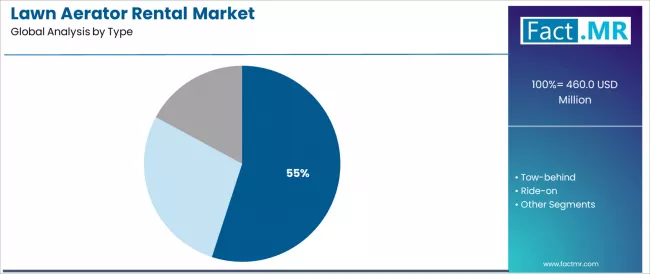
Walk-behind aerators command the leading position in the lawn aerator rental market with 55% market share through advanced aeration features, including superior soil penetration characteristics, operational efficiency, and lawn care optimization that enable consumers to achieve optimal results across diverse residential and commercial lawn applications.
The segment benefits from consumer preference for reliable aeration systems that provide consistent performance characteristics, reduced operational complexity, and efficiency optimization without requiring significant equipment expertise. Advanced design features enable automated depth control systems, performance monitoring, and integration with existing lawn care equipment, where operational performance and safety compliance represent critical consumer requirements.
Walk-behind aerators differentiate through proven operational reliability, consistent aeration characteristics, and integration with automated lawn care systems that enhance maintenance effectiveness while maintaining optimal turf standards for diverse residential and commercial applications.
Key market characteristics:
- Advanced aeration designs with optimized soil penetration configuration and operational efficiency capabilities
- Enhanced lawn care effectiveness, enabling 85-90% soil improvement consistency with reliable aeration performance
- Property compatibility, including automated monitoring systems, depth control integration, and process optimization for lawn maintenance
Tow-behind Equipment Shows Professional Market Growth
Tow-behind aerators maintain a 30% market position in the lawn aerator rental market due to their enhanced coverage properties and commercial application characteristics. These systems appeal to facilities requiring specialized performance with premium positioning for large-scale and commercial aeration applications. Market growth is driven by commercial segment expansion, emphasizing versatile equipment solutions and operational efficiency through optimized aeration designs.
Ride-on Equipment Demonstrates Commercial Solutions
Ride-on aerators capture 15% market share through specialized equipment requirements in professional operations, commercial landscaping, and large property applications. These operations demand certified equipment systems capable of operating with enhanced coverage while providing effective performance integration and operational capabilities.
By Application, Residential Applications Show Market Leadership
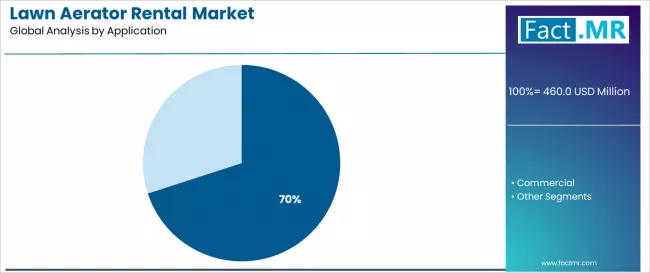
Residential applications demonstrate market leadership in the lawn aerator rental market with 70% share due to widespread adoption of homeowner lawn care systems and increasing focus on operational cost efficiency, property maintenance optimization, and lawn applications that maximize results while maintaining quality standards.
Property owners prioritize maintenance consistency, operational efficiency, and integration with existing lawn care practices that enables coordinated maintenance operations across multiple property areas. The segment benefits from substantial consumer investment and modernization programs that emphasize the acquisition of rental-based systems for lawn optimization and maintenance efficiency applications.
Residential property expansion programs incorporate aerator rental as standard equipment for lawn operations, while maintenance growth increases demand for consistent performance capabilities that comply with quality standards and minimize operational complexity.
Commercial Applications Maintain Professional Demand
Commercial applications capture 30% market share through comprehensive maintenance requirements in commercial properties, landscaping operations, and large-scale applications requiring reliable aerator systems capable of operating within professional maintenance processes while providing effective equipment integration and performance capabilities.
By Channel, Retail Channel Shows Market Leadership
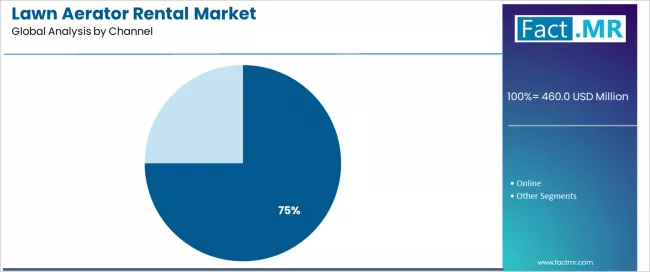
Retail channel demonstrates market leadership in the lawn aerator rental market with 75% share due to widespread adoption of traditional rental systems and increasing focus on accessibility, service flexibility, and consumer applications that maximize convenience while maintaining rental standards.
Consumers and businesses prioritize rental convenience, operational flexibility, and integration with existing equipment rental infrastructure that enables coordinated equipment operations across multiple rental applications. The segment benefits from substantial retail investment and modernization programs that emphasize the acquisition of rental-based systems for service optimization and equipment accessibility applications.
Consumer facility expansion programs incorporate retail rental as standard service for equipment operations, while usage growth increases demand for consistent rental capabilities that comply with service standards and minimize access complexity.
Application dynamics include:
- Strong growth in residential facilities and lawn operations requiring reliable equipment capabilities
- Increasing adoption in maintenance optimization and operational efficiency applications for consumers
- Rising integration with automated lawn care systems for operational optimization and property maintenance
Online Channel Distribution Shows Digital Growth
Online channel distribution captures 25% market share through comprehensive rental requirements in digital platforms, e-commerce operations, and technology-enabled applications. These operations demand reliable booking systems capable of handling substantial volumes while providing effective rental management and operational performance capabilities.
What are the Drivers, Restraints, and Key Trends of the Lawn Aerator Rental Market?
| Category | Factor | Impact | Why It Matters |
|---|---|---|---|
| Driver | Residential lawn care demand & property maintenance (lawn requirements, property standards) | ★★★★★ | Large-scale residential markets require efficient, reliable aeration solutions with consistent performance and safety compliance across lawn applications. |
| Driver | Commercial landscaping growth & facility development | ★★★★★ | Drives demand for specialized equipment solutions and high-capacity aeration capabilities; suppliers providing commercial-grade equipment gain competitive advantage. |
| Driver | Equipment rental convenience & cost efficiency (maintenance avoidance, storage solutions) | ★★★★☆ | Property owners need accessible equipment solutions; demand for rental formats expanding addressable market segments. |
| Restraint | Equipment maintenance complexity & operational requirements | ★★★★☆ | Small rental operators face operational pressure; increases cost sensitivity and affects equipment availability in budget-sensitive markets. |
| Restraint | Seasonal demand patterns & weather dependency | ★★★☆☆ | Equipment-focused applications face challenges with seasonal variations and weather requirements, limiting utilization in weather-sensitive segments. |
| Trend | Digital rental platforms & smart equipment monitoring (connected equipment management) | ★★★★★ | Growing demand for connected rental equipment; digital integration becomes core value proposition in smart equipment segments. |
| Trend | Regional market expansion & local equipment growth | ★★★★☆ | Regional facility development drives demand for local equipment solutions; regional rental capabilities drive competition toward localization. |
Analysis of the Lawn Aerator Rental Market by Key Country
The lawn aerator rental market demonstrates varied regional dynamics with growth leaders including India (4.2% growth rate) and China (3.8% growth rate) driving expansion through landscaping initiatives and property development capacity. Steady Performers encompass USA (3.4% growth rate), UK (3.3% growth rate), and Germany (3.1% growth rate), benefiting from established lawn care industries and advanced rental adoption. Mature Markets feature South Korea (3.0% growth rate) and Japan (2.8% growth rate), where equipment technology advancement and quality requirements support consistent growth patterns.
Regional synthesis reveals South Asian and East Asian markets leading adoption through property expansion and landscaping development, while Western countries maintain steady expansion supported by technology advancement and rental standardization requirements. Emerging markets show strong growth driven by lawn care applications and property modernization trends.
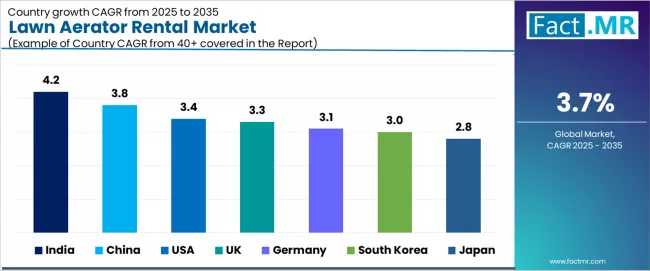
| Region/Country | 2025-2035 Growth | How to win | What to watch out |
|---|---|---|---|
| India | 4.2% | Focus on cost-effective equipment solutions | Infrastructure challenges; rental availability |
| China | 3.8% | Lead with high-volume rental systems | Environmental regulations; facility complexity |
| USA | 3.4% | Provide safety-compliant applications | EPA regulations; equipment requirements |
| UK | 3.3% | Offer premium service applications | Market saturation; facility costs |
| Germany | 3.1% | Premium quality positioning | Over-specification; regulatory compliance |
| South Korea | 3.0% | Push commercial integration solutions | Technology saturation; equipment costs |
| Japan | 2.8% | Premium efficiency positioning | Equipment precision; market maturity |
India Drives Fastest Market Growth
India establishes fastest market growth through aggressive landscaping programs and comprehensive property development capacity, integrating advanced aerator rental as standard components in residential lawn care and commercial property installations. The country's 4.2% growth rate reflects government initiatives promoting property modernization and landscaping development capabilities that mandate the use of equipment rental systems in lawn care facilities. Growth concentrates in major urban centers, including Delhi, Mumbai, and Chennai, where landscaping technology development showcases integrated equipment systems that appeal to consumers seeking advanced lawn optimization capabilities and operational property applications.
Indian rental operators are developing cost-effective equipment solutions that combine domestic rental advantages with advanced operational features, including automated delivery systems and enhanced reliability capabilities. Distribution channels through equipment suppliers and commercial service distributors expand market access, while government support for property development supports adoption across diverse consumer segments.
Strategic Market Indicators:
- Residential facilities leading adoption with 72% deployment rate in lawn care systems and property sectors
- Government landscaping programs providing substantial funding for domestic equipment technology development
- Local rental providers capturing 42% market share through competitive sourcing and localized rental support
- Export market development for cost-effective equipment solutions targeting emerging property markets
China Emerges as High-Volume Market
In Guangdong, Jiangsu, and Zhejiang provinces, residential facilities and commercial operations are implementing advanced aerator rental as standard equipment for property optimization and operational lawn enhancement, driven by increasing government property investment and landscaping modernization programs that emphasize the importance of equipment capabilities. The market holds a 3.8% growth rate, supported by government property initiatives and landscaping infrastructure development programs that promote advanced equipment systems for maintenance facilities.
Chinese operators are adopting equipment systems that provide consistent operational performance and safety compliance features, particularly appealing in property regions where facility efficiency and equipment standards represent critical operational requirements. Market expansion benefits from growing property maintenance capabilities and landscaping integration agreements that enable domestic rental of advanced equipment systems for maintenance applications. Technology adoption follows patterns established in property equipment, where efficiency and performance drive procurement decisions and operational deployment.
USA Shows Safety-Compliant Market Development
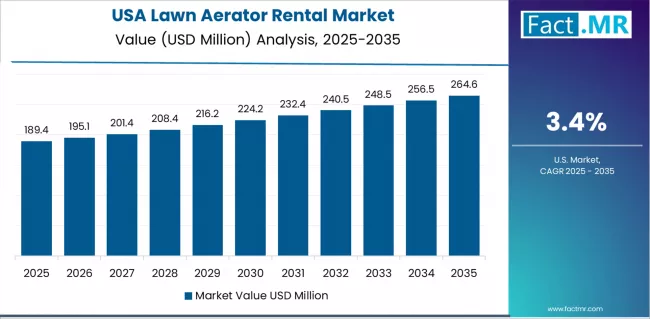
USA establishes safety-compliant market development through comprehensive lawn care programs and established safety infrastructure, integrating aerator rental across residential facilities and commercial applications. The country's 3.4% growth rate reflects mature lawn care industry relationships and established equipment adoption that supports widespread use of rental systems in maintenance facilities and safety-compliant operations. Growth concentrates in major property centers, including California, Texas, and Florida, where landscaping technology showcases mature equipment deployment that appeals to consumers seeking proven safety capabilities and operational efficiency applications.
American rental operators leverage established distribution networks and comprehensive safety capabilities, including compliance programs and technical support that create customer relationships and operational advantages. The market benefits from mature safety standards and EPA requirements that support equipment rental use while supporting technology advancement and operational optimization.
UK Shows Premium Service Market Development
UK establishes premium service market development through comprehensive landscaping programs and established quality infrastructure, integrating aerator rental across residential facilities and commercial applications. The country's 3.3% growth rate reflects mature property industry relationships and established equipment adoption that supports widespread use of rental systems in maintenance facilities and quality-compliant operations. Growth concentrates in major property centers, including London, Manchester, and Birmingham, where landscaping technology showcases mature equipment deployment that appeals to consumers seeking proven quality capabilities and operational efficiency applications.
British rental operators leverage established distribution networks and comprehensive quality capabilities, including service programs and technical support that create customer relationships and operational advantages. The market benefits from mature quality standards and regulatory requirements that support equipment rental use while supporting technology advancement and operational optimization.
Germany Demonstrates Premium Quality Focus
Germany's advanced landscaping technology market demonstrates advanced aerator rental integration with documented operational effectiveness in premium lawn care applications and modern property installations through integration with existing quality systems and maintenance infrastructure. The country maintains a 3.1% growth rate, leveraging traditional quality expertise and precision systems integration in equipment technology. Property centers, including North Rhine-Westphalia, Bavaria, and Baden-Württemberg, showcase premium installations where equipment systems integrate with traditional quality platforms and modern property management systems to optimize lawn operations and maintain maintenance quality profiles.
German rental operators prioritize equipment precision and quality consistency in aerator development, creating demand for premium systems with advanced features, including quality monitoring and automated equipment systems. The market benefits from established quality infrastructure and commitment to maintenance standards that provide long-term operational benefits and compliance with traditional quality preparation methods.
South Korea Shows Commercial Application Development
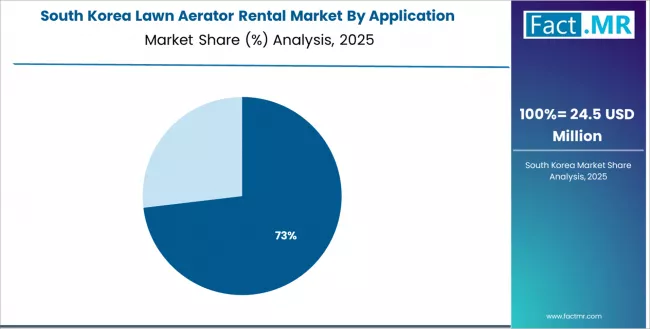
South Korea establishes commercial application development through comprehensive facility modernization and technology integration, integrating aerator rental across landscaping facilities and specialized commercial applications. The country's 3.0% growth rate reflects growing commercial investment and increasing adoption of equipment technology that supports expanding use of rental systems in Korean maintenance facilities. Growth concentrates in major commercial areas, including Seoul metropolitan area, Busan, and Incheon, where landscaping technology development showcases integrated equipment systems that appeal to Korean operators seeking advanced commercial solutions with facility efficiency compatibility.
Korean rental operators focus on maintaining quality standards while adopting commercial equipment efficiency, creating demand for systems that balance performance with operational advantages. The market benefits from strong commercial infrastructure and growing property opportunities that support equipment technology adoption while maintaining quality standards important to Korean commercial applications.
Japan Demonstrates Premium Efficiency Focus
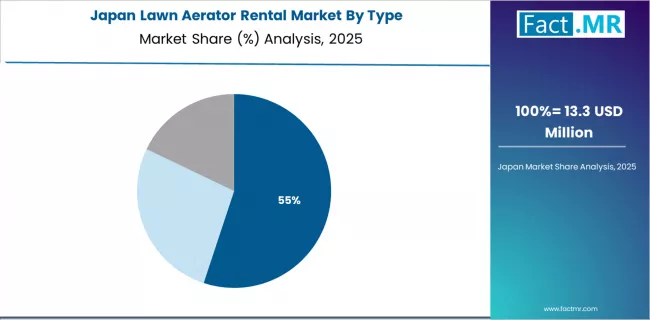
Japan's advanced landscaping technology market demonstrates advanced aerator rental integration with documented operational effectiveness in premium lawn care applications and modern property installations through integration with existing efficiency systems and maintenance infrastructure. The country maintains a 2.8% growth rate, leveraging traditional efficiency expertise and precision systems integration in equipment technology. Property centers, including Tokyo, Osaka, and Nagoya, showcase premium installations where equipment systems integrate with traditional efficiency platforms and modern property management systems to optimize lawn operations and maintain maintenance efficiency profiles.
Japanese rental operators prioritize equipment precision and efficiency consistency in aerator development, creating demand for premium systems with advanced features, including efficiency monitoring and automated equipment systems. The market benefits from established efficiency infrastructure and commitment to maintenance standards that provide long-term operational benefits and compliance with traditional quality preparation methods.
Europe Market Split by Country
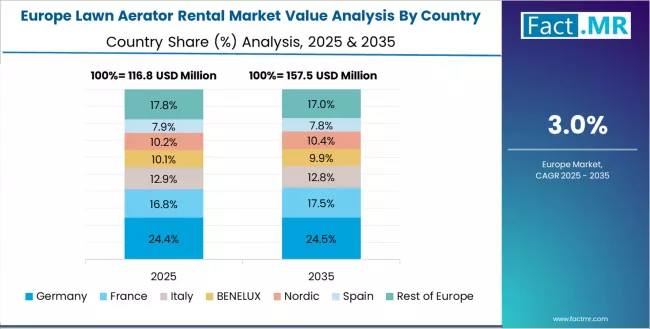
The European lawn aerator rental market is projected to represent a significant portion of global consumption, with strong regional distribution across major economies. Germany is expected to maintain its leadership position with USD 90.0 million in 2025, accounting for substantial European market share, supported by its advanced landscaping infrastructure and major property centers.
United Kingdom follows with USD 70.0 million, representing significant European market share in 2025, driven by comprehensive lawn care programs and equipment technology development initiatives. France holds USD 60.0 million through specialized maintenance applications and quality compliance requirements. Italy commands USD 50.0 million, while Spain accounts for USD 40.0 million in 2025. The rest of Europe region maintains USD 150.0 million, attributed to increasing equipment rental adoption in Nordic countries and emerging property facilities implementing maintenance modernization programs.
Competitive Landscape of the Lawn Aerator Rental Market
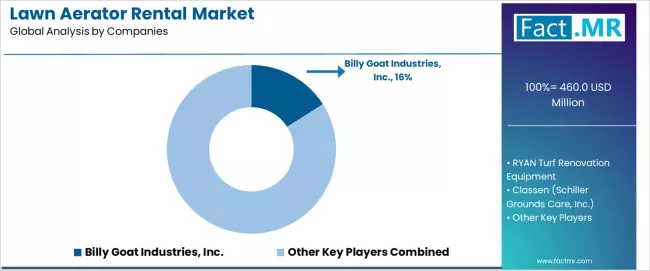
- Structure: ~10-15 active players; top 3-4 hold ~35-40% by revenue, with Billy Goat leading at 14.0% market share.
- Leadership is maintained through: regional rental networks, specialized equipment systems, and local service capabilities (multi-equipment versatility + delivery support + maintenance compliance).
- What's commoditizing: standard equipment rental and basic maintenance systems.
- Margin Opportunities: specialized commercial applications, IoT-enabled monitoring, and comprehensive rental contracts (predictive maintenance, equipment management, compliance documentation).
| Stakeholder | What they actually control | Typical strengths | Typical blind spots |
|---|---|---|---|
| Global platforms | Rental networks, broad equipment portfolios, maintenance facilities | Proven reliability, multi-region support, comprehensive service | Technology refresh cycles; customer lock-in dependency |
| Technology innovators | R&D capabilities; advanced equipment systems; digital interfaces | Latest technology first; attractive ROI on specialized applications | Service density outside core regions; customization complexity |
| Regional specialists | Local sourcing, fast delivery, nearby technical support | "Close to site" support; pragmatic pricing; local regulations | Technology gaps; talent retention in engineering |
| Application-focused ecosystems | Industry expertise, technical support, specialized solutions | Lowest application variation; comprehensive industry support | Scaling costs if overpromised; technology obsolescence |
| Service specialists | Rental programs, equipment supply, technical training | Win service-intensive applications; flexible support | Scalability limitations; narrow market focus |
Key Players in the Lawn Aerator Rental Market
- Billy Goat Industries, Inc.
- RYAN Turf Renovation Equipment
- Classen (Schiller Grounds Care, Inc.)
- The Toro Company
- Blue Bird Corporation
- Deere & Company (John Deere)
- ANDREAS STIHL AG & Co. KG
- Husqvarna AB
- Sunbelt Rentals, Inc.
- United Rentals, Inc.
- Boels Rental B.V.
- HSS Hire Group plc
- Honda Motor Co., Ltd.
- Makita Corporation
- ECHO, Inc.
Scope of the Report
| Items | Values |
|---|---|
| Quantitative Units (2025) | USD 460.0 million |
| Type | Walk-behind, Tow-behind, Ride-on |
| Application | Residential, Commercial |
| Channel | Retail, Online |
| Regions Covered | East Asia, Western Europe, South Asia Pacific, North America, Latin America, Middle East & Africa |
| Countries Covered | China, Germany, United States, Japan, India, South Korea, UK, France, Italy, and 25+ additional countries |
| Key Companies Profiled | Billy Goat, Ryan Turf, Classen, Toro, BlueBird, John Deere, Stihl, Husqvarna, Sunbelt, United Rentals |
| Additional Attributes | Dollar sales by type and channel categories, regional adoption trends across East Asia, Western Europe, and South Asia Pacific, competitive landscape with equipment suppliers and rental providers, consumer preferences for aeration consistency and operational reliability, integration with lawn care platforms and equipment monitoring systems, innovations in equipment technology and rental enhancement, and development of advanced aerator solutions with enhanced performance and property optimization capabilities. |
Lawn Aerator Rental Market by Segments
-
Type :
- Walk-behind
- Tow-behind
- Ride-on
-
Application :
- Residential
- Commercial
-
Channel :
- Retail
- Online
-
Region :
- East Asia
- China
- Japan
- South Korea
- South Asia Pacific
- India
- ASEAN
- Australia & New Zealand
- Rest of South Asia Pacific
- Western Europe
- Germany
- France
- United Kingdom
- Italy
- Spain
- Rest of Western Europe
- North America
- United States
- Canada
- Mexico
- Latin America
- Brazil
- Rest of Latin America
- Middle East & Africa
- GCC Countries
- South Africa
- Rest of Middle East & Africa
- East Asia
Table of Content
- Executive Summary
- Global Market Outlook
- Demand to side Trends
- Supply to side Trends
- Technology Roadmap Analysis
- Analysis and Recommendations
- Market Overview
- Market Coverage / Taxonomy
- Market Definition / Scope / Limitations
- Market Background
- Market Dynamics
- Drivers
- Restraints
- Opportunity
- Trends
- Scenario Forecast
- Demand in Optimistic Scenario
- Demand in Likely Scenario
- Demand in Conservative Scenario
- Opportunity Map Analysis
- Product Life Cycle Analysis
- Supply Chain Analysis
- Investment Feasibility Matrix
- Value Chain Analysis
- PESTLE and Porter’s Analysis
- Regulatory Landscape
- Regional Parent Market Outlook
- Production and Consumption Statistics
- Import and Export Statistics
- Market Dynamics
- Global Market Analysis 2020 to 2024 and Forecast, 2025 to 2035
- Historical Market Size Value (USD Million) Analysis, 2020 to 2024
- Current and Future Market Size Value (USD Million) Projections, 2025 to 2035
- Y to o to Y Growth Trend Analysis
- Absolute $ Opportunity Analysis
- Global Market Pricing Analysis 2020 to 2024 and Forecast 2025 to 2035
- Global Market Analysis 2020 to 2024 and Forecast 2025 to 2035, By Type
- Introduction / Key Findings
- Historical Market Size Value (USD Million) Analysis By Type , 2020 to 2024
- Current and Future Market Size Value (USD Million) Analysis and Forecast By Type , 2025 to 2035
- Walk-behind
- Tow-behind
- Ride-on
- Y to o to Y Growth Trend Analysis By Type , 2020 to 2024
- Absolute $ Opportunity Analysis By Type , 2025 to 2035
- Global Market Analysis 2020 to 2024 and Forecast 2025 to 2035, By Application
- Introduction / Key Findings
- Historical Market Size Value (USD Million) Analysis By Application, 2020 to 2024
- Current and Future Market Size Value (USD Million) Analysis and Forecast By Application, 2025 to 2035
- Residential
- Commercial
- Y to o to Y Growth Trend Analysis By Application, 2020 to 2024
- Absolute $ Opportunity Analysis By Application, 2025 to 2035
- Global Market Analysis 2020 to 2024 and Forecast 2025 to 2035, By Channel
- Introduction / Key Findings
- Historical Market Size Value (USD Million) Analysis By Channel, 2020 to 2024
- Current and Future Market Size Value (USD Million) Analysis and Forecast By Channel, 2025 to 2035
- Retail
- Online
- Y to o to Y Growth Trend Analysis By Channel, 2020 to 2024
- Absolute $ Opportunity Analysis By Channel, 2025 to 2035
- Global Market Analysis 2020 to 2024 and Forecast 2025 to 2035, By Region
- Introduction
- Historical Market Size Value (USD Million) Analysis By Region, 2020 to 2024
- Current Market Size Value (USD Million) Analysis and Forecast By Region, 2025 to 2035
- North America
- Latin America
- Western Europe
- Eastern Europe
- East Asia
- South Asia and Pacific
- Middle East & Africa
- Market Attractiveness Analysis By Region
- North America Market Analysis 2020 to 2024 and Forecast 2025 to 2035, By Country
- Historical Market Size Value (USD Million) Trend Analysis By Market Taxonomy, 2020 to 2024
- Market Size Value (USD Million) Forecast By Market Taxonomy, 2025 to 2035
- By Country
- USA
- Canada
- Mexico
- By Type
- By Application
- By Channel
- By Country
- Market Attractiveness Analysis
- By Country
- By Type
- By Application
- By Channel
- Key Takeaways
- Latin America Market Analysis 2020 to 2024 and Forecast 2025 to 2035, By Country
- Historical Market Size Value (USD Million) Trend Analysis By Market Taxonomy, 2020 to 2024
- Market Size Value (USD Million) Forecast By Market Taxonomy, 2025 to 2035
- By Country
- Brazil
- Chile
- Rest of Latin America
- By Type
- By Application
- By Channel
- By Country
- Market Attractiveness Analysis
- By Country
- By Type
- By Application
- By Channel
- Key Takeaways
- Western Europe Market Analysis 2020 to 2024 and Forecast 2025 to 2035, By Country
- Historical Market Size Value (USD Million) Trend Analysis By Market Taxonomy, 2020 to 2024
- Market Size Value (USD Million) Forecast By Market Taxonomy, 2025 to 2035
- By Country
- Germany
- UK
- Italy
- Spain
- France
- Nordic
- BENELUX
- Rest of Western Europe
- By Type
- By Application
- By Channel
- By Country
- Market Attractiveness Analysis
- By Country
- By Type
- By Application
- By Channel
- Key Takeaways
- Eastern Europe Market Analysis 2020 to 2024 and Forecast 2025 to 2035, By Country
- Historical Market Size Value (USD Million) Trend Analysis By Market Taxonomy, 2020 to 2024
- Market Size Value (USD Million) Forecast By Market Taxonomy, 2025 to 2035
- By Country
- Russia
- Poland
- Hungary
- Balkan & Baltic
- Rest of Eastern Europe
- By Type
- By Application
- By Channel
- By Country
- Market Attractiveness Analysis
- By Country
- By Type
- By Application
- By Channel
- Key Takeaways
- East Asia Market Analysis 2020 to 2024 and Forecast 2025 to 2035, By Country
- Historical Market Size Value (USD Million) Trend Analysis By Market Taxonomy, 2020 to 2024
- Market Size Value (USD Million) Forecast By Market Taxonomy, 2025 to 2035
- By Country
- China
- Japan
- South Korea
- By Type
- By Application
- By Channel
- By Country
- Market Attractiveness Analysis
- By Country
- By Type
- By Application
- By Channel
- Key Takeaways
- South Asia and Pacific Market Analysis 2020 to 2024 and Forecast 2025 to 2035, By Country
- Historical Market Size Value (USD Million) Trend Analysis By Market Taxonomy, 2020 to 2024
- Market Size Value (USD Million) Forecast By Market Taxonomy, 2025 to 2035
- By Country
- India
- ASEAN
- Australia & New Zealand
- Rest of South Asia and Pacific
- By Type
- By Application
- By Channel
- By Country
- Market Attractiveness Analysis
- By Country
- By Type
- By Application
- By Channel
- Key Takeaways
- Middle East & Africa Market Analysis 2020 to 2024 and Forecast 2025 to 2035, By Country
- Historical Market Size Value (USD Million) Trend Analysis By Market Taxonomy, 2020 to 2024
- Market Size Value (USD Million) Forecast By Market Taxonomy, 2025 to 2035
- By Country
- Kingdom of Saudi Arabia
- Other GCC Countries
- Turkiye
- South Africa
- Other African Union
- Rest of Middle East & Africa
- By Type
- By Application
- By Channel
- By Country
- Market Attractiveness Analysis
- By Country
- By Type
- By Application
- By Channel
- Key Takeaways
- Key Countries Market Analysis
- USA
- Pricing Analysis
- Market Share Analysis, 2024
- By Type
- By Application
- By Channel
- Canada
- Pricing Analysis
- Market Share Analysis, 2024
- By Type
- By Application
- By Channel
- Mexico
- Pricing Analysis
- Market Share Analysis, 2024
- By Type
- By Application
- By Channel
- Brazil
- Pricing Analysis
- Market Share Analysis, 2024
- By Type
- By Application
- By Channel
- Chile
- Pricing Analysis
- Market Share Analysis, 2024
- By Type
- By Application
- By Channel
- Germany
- Pricing Analysis
- Market Share Analysis, 2024
- By Type
- By Application
- By Channel
- UK
- Pricing Analysis
- Market Share Analysis, 2024
- By Type
- By Application
- By Channel
- Italy
- Pricing Analysis
- Market Share Analysis, 2024
- By Type
- By Application
- By Channel
- Spain
- Pricing Analysis
- Market Share Analysis, 2024
- By Type
- By Application
- By Channel
- France
- Pricing Analysis
- Market Share Analysis, 2024
- By Type
- By Application
- By Channel
- India
- Pricing Analysis
- Market Share Analysis, 2024
- By Type
- By Application
- By Channel
- ASEAN
- Pricing Analysis
- Market Share Analysis, 2024
- By Type
- By Application
- By Channel
- Australia & New Zealand
- Pricing Analysis
- Market Share Analysis, 2024
- By Type
- By Application
- By Channel
- China
- Pricing Analysis
- Market Share Analysis, 2024
- By Type
- By Application
- By Channel
- Japan
- Pricing Analysis
- Market Share Analysis, 2024
- By Type
- By Application
- By Channel
- South Korea
- Pricing Analysis
- Market Share Analysis, 2024
- By Type
- By Application
- By Channel
- Russia
- Pricing Analysis
- Market Share Analysis, 2024
- By Type
- By Application
- By Channel
- Poland
- Pricing Analysis
- Market Share Analysis, 2024
- By Type
- By Application
- By Channel
- Hungary
- Pricing Analysis
- Market Share Analysis, 2024
- By Type
- By Application
- By Channel
- Kingdom of Saudi Arabia
- Pricing Analysis
- Market Share Analysis, 2024
- By Type
- By Application
- By Channel
- Turkiye
- Pricing Analysis
- Market Share Analysis, 2024
- By Type
- By Application
- By Channel
- South Africa
- Pricing Analysis
- Market Share Analysis, 2024
- By Type
- By Application
- By Channel
- USA
- Market Structure Analysis
- Competition Dashboard
- Competition Benchmarking
- Market Share Analysis of Top Players
- By Regional
- By Type
- By Application
- By Channel
- Competition Analysis
- Competition Deep Dive
- Billy Goat Industries, Inc.
- Overview
- Product Portfolio
- Profitability by Market Segments (Product/Age /Sales Channel/Region)
- Sales Footprint
- Strategy Overview
- Marketing Strategy
- Product Strategy
- Channel Strategy
- RYAN Turf Renovation Equipment
- Classen (Schiller Grounds Care, Inc.)
- The Toro Company
- Blue Bird Corporation
- Deere & Company (John Deere)
- ANDREAS STIHL AG & Co. KG
- Husqvarna AB
- Sunbelt Rentals, Inc.
- Value (USD Million)ed Rentals, Inc.
- Boels Rental B.V.
- HSS Hire Group plc
- Honda Motor Co., Ltd.
- Makita Corporation
- ECHO, Inc.
- Billy Goat Industries, Inc.
- Competition Deep Dive
- Assumptions & Acronyms Used
- Research Methodology
List Of Table
- Table 1: Global Market Value (USD Million) Forecast by Region, 2020 to 2035
- Table 2: Global Market Value (USD Million) Forecast by Type , 2020 to 2035
- Table 3: Global Market Value (USD Million) Forecast by Application, 2020 to 2035
- Table 4: Global Market Value (USD Million) Forecast by Channel, 2020 to 2035
- Table 5: North America Market Value (USD Million) Forecast by Country, 2020 to 2035
- Table 6: North America Market Value (USD Million) Forecast by Type , 2020 to 2035
- Table 7: North America Market Value (USD Million) Forecast by Application, 2020 to 2035
- Table 8: North America Market Value (USD Million) Forecast by Channel, 2020 to 2035
- Table 9: Latin America Market Value (USD Million) Forecast by Country, 2020 to 2035
- Table 10: Latin America Market Value (USD Million) Forecast by Type , 2020 to 2035
- Table 11: Latin America Market Value (USD Million) Forecast by Application, 2020 to 2035
- Table 12: Latin America Market Value (USD Million) Forecast by Channel, 2020 to 2035
- Table 13: Western Europe Market Value (USD Million) Forecast by Country, 2020 to 2035
- Table 14: Western Europe Market Value (USD Million) Forecast by Type , 2020 to 2035
- Table 15: Western Europe Market Value (USD Million) Forecast by Application, 2020 to 2035
- Table 16: Western Europe Market Value (USD Million) Forecast by Channel, 2020 to 2035
- Table 17: Eastern Europe Market Value (USD Million) Forecast by Country, 2020 to 2035
- Table 18: Eastern Europe Market Value (USD Million) Forecast by Type , 2020 to 2035
- Table 19: Eastern Europe Market Value (USD Million) Forecast by Application, 2020 to 2035
- Table 20: Eastern Europe Market Value (USD Million) Forecast by Channel, 2020 to 2035
- Table 21: East Asia Market Value (USD Million) Forecast by Country, 2020 to 2035
- Table 22: East Asia Market Value (USD Million) Forecast by Type , 2020 to 2035
- Table 23: East Asia Market Value (USD Million) Forecast by Application, 2020 to 2035
- Table 24: East Asia Market Value (USD Million) Forecast by Channel, 2020 to 2035
- Table 25: South Asia and Pacific Market Value (USD Million) Forecast by Country, 2020 to 2035
- Table 26: South Asia and Pacific Market Value (USD Million) Forecast by Type , 2020 to 2035
- Table 27: South Asia and Pacific Market Value (USD Million) Forecast by Application, 2020 to 2035
- Table 28: South Asia and Pacific Market Value (USD Million) Forecast by Channel, 2020 to 2035
- Table 29: Middle East & Africa Market Value (USD Million) Forecast by Country, 2020 to 2035
- Table 30: Middle East & Africa Market Value (USD Million) Forecast by Type , 2020 to 2035
- Table 31: Middle East & Africa Market Value (USD Million) Forecast by Application, 2020 to 2035
- Table 32: Middle East & Africa Market Value (USD Million) Forecast by Channel, 2020 to 2035
List Of Figures
- Figure 1: Global Market Pricing Analysis
- Figure 2: Global Market Value (USD Million) Forecast 2020-2035
- Figure 3: Global Market Value Share and BPS Analysis by Type , 2025 and 2035
- Figure 4: Global Market Y to o to Y Growth Comparison by Type , 2025-2035
- Figure 5: Global Market Attractiveness Analysis by Type
- Figure 6: Global Market Value Share and BPS Analysis by Application, 2025 and 2035
- Figure 7: Global Market Y to o to Y Growth Comparison by Application, 2025-2035
- Figure 8: Global Market Attractiveness Analysis by Application
- Figure 9: Global Market Value Share and BPS Analysis by Channel, 2025 and 2035
- Figure 10: Global Market Y to o to Y Growth Comparison by Channel, 2025-2035
- Figure 11: Global Market Attractiveness Analysis by Channel
- Figure 12: Global Market Value (USD Million) Share and BPS Analysis by Region, 2025 and 2035
- Figure 13: Global Market Y to o to Y Growth Comparison by Region, 2025-2035
- Figure 14: Global Market Attractiveness Analysis by Region
- Figure 15: North America Market Incremental Dollar Opportunity, 2025-2035
- Figure 16: Latin America Market Incremental Dollar Opportunity, 2025-2035
- Figure 17: Western Europe Market Incremental Dollar Opportunity, 2025-2035
- Figure 18: Eastern Europe Market Incremental Dollar Opportunity, 2025-2035
- Figure 19: East Asia Market Incremental Dollar Opportunity, 2025-2035
- Figure 20: South Asia and Pacific Market Incremental Dollar Opportunity, 2025-2035
- Figure 21: Middle East & Africa Market Incremental Dollar Opportunity, 2025-2035
- Figure 22: North America Market Value Share and BPS Analysis by Country, 2025 and 2035
- Figure 23: North America Market Value Share and BPS Analysis by Type , 2025 and 2035
- Figure 24: North America Market Y to o to Y Growth Comparison by Type , 2025-2035
- Figure 25: North America Market Attractiveness Analysis by Type
- Figure 26: North America Market Value Share and BPS Analysis by Application, 2025 and 2035
- Figure 27: North America Market Y to o to Y Growth Comparison by Application, 2025-2035
- Figure 28: North America Market Attractiveness Analysis by Application
- Figure 29: North America Market Value Share and BPS Analysis by Channel, 2025 and 2035
- Figure 30: North America Market Y to o to Y Growth Comparison by Channel, 2025-2035
- Figure 31: North America Market Attractiveness Analysis by Channel
- Figure 32: Latin America Market Value Share and BPS Analysis by Country, 2025 and 2035
- Figure 33: Latin America Market Value Share and BPS Analysis by Type , 2025 and 2035
- Figure 34: Latin America Market Y to o to Y Growth Comparison by Type , 2025-2035
- Figure 35: Latin America Market Attractiveness Analysis by Type
- Figure 36: Latin America Market Value Share and BPS Analysis by Application, 2025 and 2035
- Figure 37: Latin America Market Y to o to Y Growth Comparison by Application, 2025-2035
- Figure 38: Latin America Market Attractiveness Analysis by Application
- Figure 39: Latin America Market Value Share and BPS Analysis by Channel, 2025 and 2035
- Figure 40: Latin America Market Y to o to Y Growth Comparison by Channel, 2025-2035
- Figure 41: Latin America Market Attractiveness Analysis by Channel
- Figure 42: Western Europe Market Value Share and BPS Analysis by Country, 2025 and 2035
- Figure 43: Western Europe Market Value Share and BPS Analysis by Type , 2025 and 2035
- Figure 44: Western Europe Market Y to o to Y Growth Comparison by Type , 2025-2035
- Figure 45: Western Europe Market Attractiveness Analysis by Type
- Figure 46: Western Europe Market Value Share and BPS Analysis by Application, 2025 and 2035
- Figure 47: Western Europe Market Y to o to Y Growth Comparison by Application, 2025-2035
- Figure 48: Western Europe Market Attractiveness Analysis by Application
- Figure 49: Western Europe Market Value Share and BPS Analysis by Channel, 2025 and 2035
- Figure 50: Western Europe Market Y to o to Y Growth Comparison by Channel, 2025-2035
- Figure 51: Western Europe Market Attractiveness Analysis by Channel
- Figure 52: Eastern Europe Market Value Share and BPS Analysis by Country, 2025 and 2035
- Figure 53: Eastern Europe Market Value Share and BPS Analysis by Type , 2025 and 2035
- Figure 54: Eastern Europe Market Y to o to Y Growth Comparison by Type , 2025-2035
- Figure 55: Eastern Europe Market Attractiveness Analysis by Type
- Figure 56: Eastern Europe Market Value Share and BPS Analysis by Application, 2025 and 2035
- Figure 57: Eastern Europe Market Y to o to Y Growth Comparison by Application, 2025-2035
- Figure 58: Eastern Europe Market Attractiveness Analysis by Application
- Figure 59: Eastern Europe Market Value Share and BPS Analysis by Channel, 2025 and 2035
- Figure 60: Eastern Europe Market Y to o to Y Growth Comparison by Channel, 2025-2035
- Figure 61: Eastern Europe Market Attractiveness Analysis by Channel
- Figure 62: East Asia Market Value Share and BPS Analysis by Country, 2025 and 2035
- Figure 63: East Asia Market Value Share and BPS Analysis by Type , 2025 and 2035
- Figure 64: East Asia Market Y to o to Y Growth Comparison by Type , 2025-2035
- Figure 65: East Asia Market Attractiveness Analysis by Type
- Figure 66: East Asia Market Value Share and BPS Analysis by Application, 2025 and 2035
- Figure 67: East Asia Market Y to o to Y Growth Comparison by Application, 2025-2035
- Figure 68: East Asia Market Attractiveness Analysis by Application
- Figure 69: East Asia Market Value Share and BPS Analysis by Channel, 2025 and 2035
- Figure 70: East Asia Market Y to o to Y Growth Comparison by Channel, 2025-2035
- Figure 71: East Asia Market Attractiveness Analysis by Channel
- Figure 72: South Asia and Pacific Market Value Share and BPS Analysis by Country, 2025 and 2035
- Figure 73: South Asia and Pacific Market Value Share and BPS Analysis by Type , 2025 and 2035
- Figure 74: South Asia and Pacific Market Y to o to Y Growth Comparison by Type , 2025-2035
- Figure 75: South Asia and Pacific Market Attractiveness Analysis by Type
- Figure 76: South Asia and Pacific Market Value Share and BPS Analysis by Application, 2025 and 2035
- Figure 77: South Asia and Pacific Market Y to o to Y Growth Comparison by Application, 2025-2035
- Figure 78: South Asia and Pacific Market Attractiveness Analysis by Application
- Figure 79: South Asia and Pacific Market Value Share and BPS Analysis by Channel, 2025 and 2035
- Figure 80: South Asia and Pacific Market Y to o to Y Growth Comparison by Channel, 2025-2035
- Figure 81: South Asia and Pacific Market Attractiveness Analysis by Channel
- Figure 82: Middle East & Africa Market Value Share and BPS Analysis by Country, 2025 and 2035
- Figure 83: Middle East & Africa Market Value Share and BPS Analysis by Type , 2025 and 2035
- Figure 84: Middle East & Africa Market Y to o to Y Growth Comparison by Type , 2025-2035
- Figure 85: Middle East & Africa Market Attractiveness Analysis by Type
- Figure 86: Middle East & Africa Market Value Share and BPS Analysis by Application, 2025 and 2035
- Figure 87: Middle East & Africa Market Y to o to Y Growth Comparison by Application, 2025-2035
- Figure 88: Middle East & Africa Market Attractiveness Analysis by Application
- Figure 89: Middle East & Africa Market Value Share and BPS Analysis by Channel, 2025 and 2035
- Figure 90: Middle East & Africa Market Y to o to Y Growth Comparison by Channel, 2025-2035
- Figure 91: Middle East & Africa Market Attractiveness Analysis by Channel
- Figure 92: Global Market - Tier Structure Analysis
- Figure 93: Global Market - Company Share Analysis
- FAQs -
How big is the lawn aerator rental market in 2025?
The global lawn aerator rental market is estimated to be valued at USD 460.0 million in 2025.
What will be the size of lawn aerator rental market in 2035?
The market size for the lawn aerator rental market is projected to reach USD 660.0 million by 2035.
How much will be the lawn aerator rental market growth between 2025 and 2035?
The lawn aerator rental market is expected to grow at a 3.7% CAGR between 2025 and 2035.
What are the key product types in the lawn aerator rental market?
The key product types in lawn aerator rental market are walk-behind, tow-behind and ride-on.
Which application segment to contribute significant share in the lawn aerator rental market in 2025?
In terms of application, residential segment to command 70.0% share in the lawn aerator rental market in 2025.